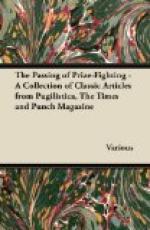1.—Those who write a
piece which faileth through its own demerits,
which may be, as—
A.—He that writeth
a farce or comedy, and neglecteth to
introduce jokes in the same.
B.—He that writeth
a farce or comedy, and introduceth bad
jokes in the same.
C.—He that writeth
a farce or comedy, and introduceth old
jokes in the same.
D.—He that writeth
a tragedy, and introduceth matter for
merriment therein.
E.—He that, in either
tragedy, comedy, farce, or other
entertainment, shocketh the propriety
of the audience, or
causeth a division in the same, by political
allusions.
2.—He that writeth a
piece which faileth, though not through its
own demerits, which may be, as—
A.—When the principal
actor, not having the author’s words by
heart, and being of a suggestive wit and
good assurance,
substituteth others, which he deemeth sufficient.
B.—When the principal
actor, not having the author’s words by
heart, and being of a dull and heavy turn,
and deaf withal,
substituteth nothing, but standeth aghast,
yearning for the
voice of the prompter.
C.—When
the scene-shifter ingeniously introduceth a forest
into
a
bed-chamber, or committeth the like incongruity, marvellous
pleasant
and mirthful to behold, but in no way conducive to
success.
D.—When
pistols or other fire-arms do miss fire; when red fire
igniteth
not, or igniteth the scenes; when a trap-door
refuseth
to open, a rope to draw, and the like.
E.—When
the author intrusteth his principal part to a new actor,
and
it falleth out that the same doth grievously offend
the
audience,
who straight insist that he do quit the stage,
whereby
the ruin of the piece is consummated.
F.—Likewise
there be misfortunes that arise from the audience;
as,
when at a momentous point of the plot there entereth
one
heated
with liquor, and causeth a disturbance, or a woman
with
a huge bonnet becometh the subject of a discussion
as to
her
right to wear the same, and impede the view of them
that
be
behind; also when there cometh in a ruffian, or more,
in a
pea-coat,
who having been charged by an enemy to work the
ruin
of the piece, endeavoureth to do the same, by dint
of
hisses
or other unseemly noises, all of which be highly
pernicious.
Secondly, of those unfortunate authors who have been successful, there be—
1.—He whose piece,
albeit successful, is withdrawn to make room
for
the Christmas pantomine, Easter piece, or other
entertainment
equally cherished by the manager, who thereupon
groundeth
a plea of non-payment.




